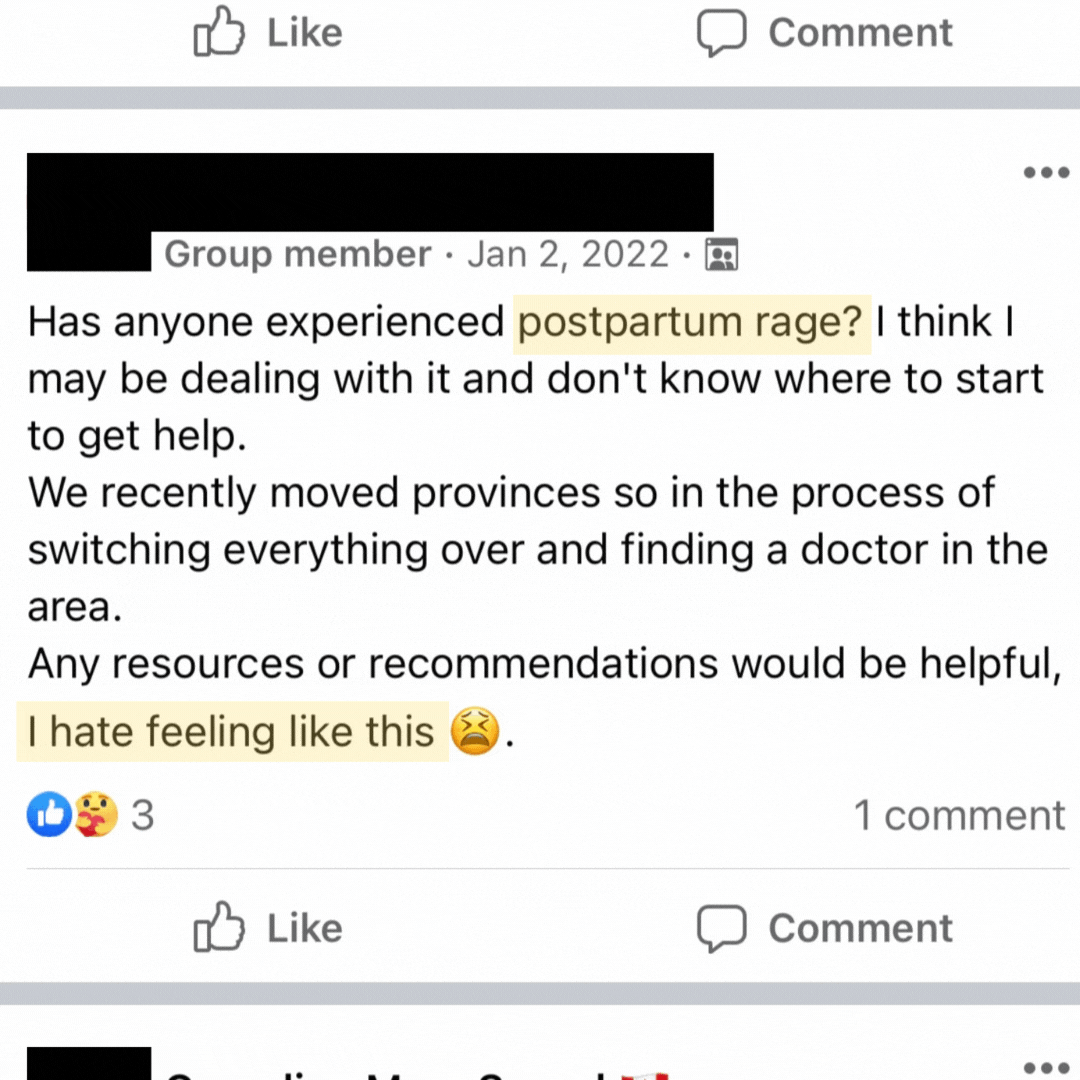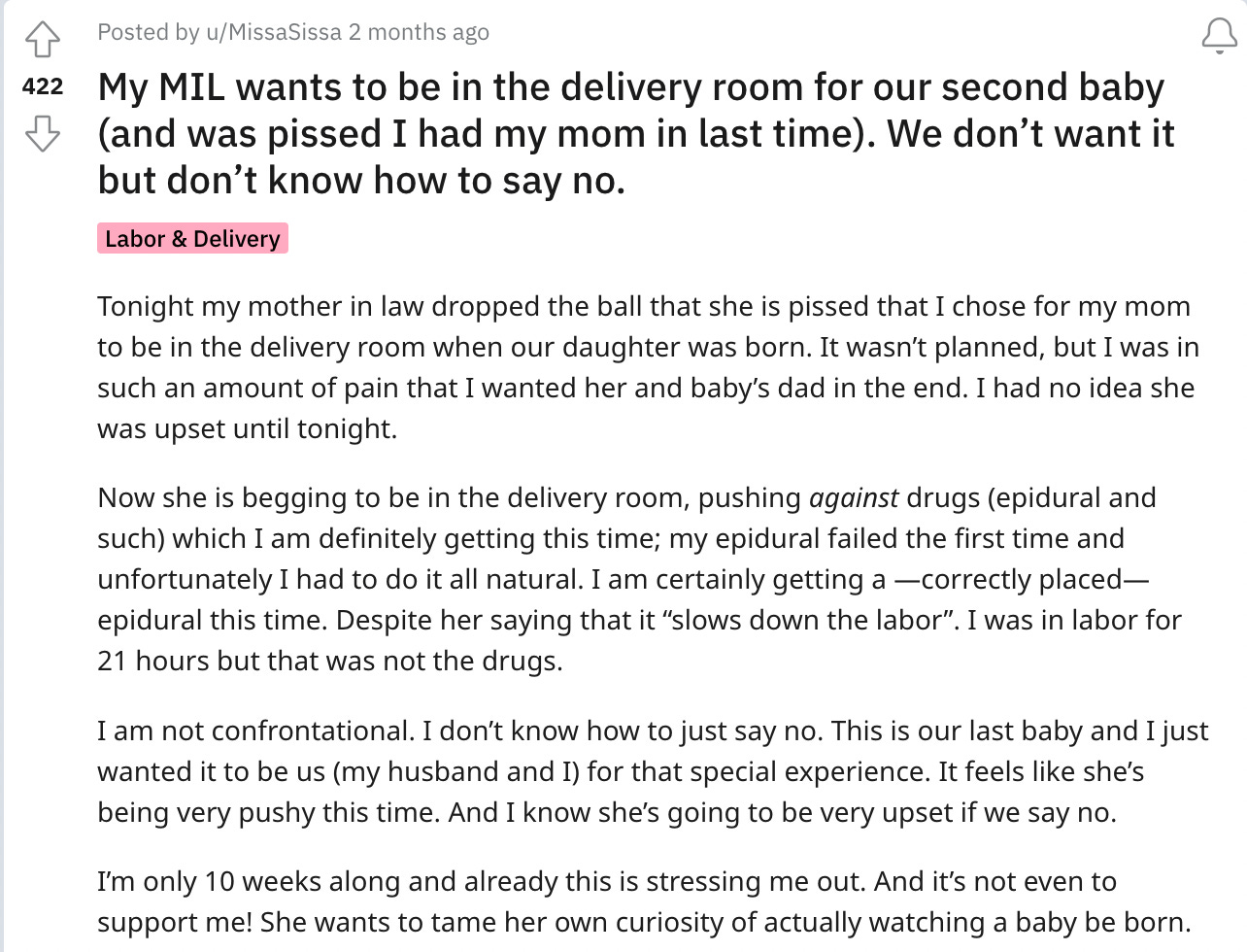Issue No. 2: Your child's first bully
Start breaking generational trauma, a royal penis 👀, and whether to have your MIL in your birthing room.
IN THIS ISSUE
✍🏽 Essay: Your child's first bully… And that’s on generational trauma.
📱 Weekly Round Up: Prince Harry spills the tea (in his lap); this week is objectively depressing; and wtf is ChatGPT?
🔥 Ask Your Mom: Should you let your MIL in your birthing room?
Being forced to sit on a hard metal chair for as long as 16 consecutive hours was a standard punishment for teenagers at these “therapy ranches.” Still growing, the repetitive pressure against their backs would cause long-term scar damage.
These facilities, after all, offer the kind of “treatment” where parents allow strangers to pull their “troubled” teens out of their beds in the middle of the night and take them away in the hope they will return… obedient.
The stories the above-linked creator tells are awful, but it was one of her answers that sent a chill down my spine. Someone asked why their methods have to be so severe. It’s a reasonable question. In addition to isolating these kids from their homes and using them for free labour (which they do), why do they have to be so damn cruel about it?
The answer? That’s what the parents were paying for.
They knew exactly what they signed up for. They wanted someone to pummel the spirit out of their kid and make them so desperate to come home that they’d be begging to embody their parent’s vision of what a “good kid” is (subservient).
Sure, it’s clear to us that this is twisted. Yet many of us grew up in “you will respect me”, “because I said so,” “I put a roof over your head” authoritarian-type households where kids – and never parents – are expected to apologize.
It may not be as extreme as these therapy ranches, but the sentiment is eerily similar. It’s the kind of parenting that expects kids to do, and be, what parents desire – simply because they desire it. The kind of ego-driven parenting that, in wielding such an unparalleled advantage, teaches children they are powerless.
And without thinking about it, that’s exactly how parents become their child’s first bully.
Unless you grew up in an outlier home where against the grain, gentle/respectful parenting was conducted (and most likely judged), many Millennials/GenZ are now becoming parents off the back of coercive, to trauma-based, parenting practices.
Look, most people do not aspire to hurt their children. But it’s something that’s written in our histories, our epigenetics — and in our denial. It thrives in the dark corners of our emotional immaturity, and grows in the deep pain of our core wounds.
It’s a possibility all parents should reflect on. If fact, it’s one that will likely look every parent square in the face at some point, demanding to be reckoned with whether you want to or not. It was something I had to explore early in my parenting journey.
Because children – yes, even babies – are triggering.
For me, it started with noise. No one warned me about how over-stimulating a crying newborn or whining toddler could be. There were many points during those early months when I’d have to put my daughter down in her bassinet, and go to the bathroom to scream and cry alone.
While I can now look back compassionately and see that first year was about surviving, I hadn’t expected to have those reactions and felt so much shame. I didn’t understand that I just hadn’t learned to build the right coping mechanisms – and that this period can be hard on most people at the best of times.
Quick note in case you’re in the thick of newborn life: the game you’re playing is called ‘keep the baby alive and don’t shake the baby.’ That’s it. If you’re doing that, you’re doing the work – and you are doing great.
I fumbled my way through and by the time I had a not quite two-year-old, things began to feel easier. So much in fact, that with my head not completely under water for the first time in months, I could notice myself a little more.
On one particularly noisy, messy and whiny day, I noticed myself at the sink cleaning dishes. I noticed myself angrily think that all my efforts were not likely to make a dent in the chaotic mess of our house. And at nearly nine months pregnant (yes, again), I noticed that I was feeling pretty fucking fed up.
Then my toddler came up to me and started whining and yelling even louder. As she screamed and pulled at my shirt, I noticed myself recoil. Plainly put, she was pissing me off. And an impulse that I had never felt in my friendships or even in my marriage crept over me…
I wanted to give her the silent treatment.
Um, what the fuck? What is silent treatment, after all, but coercion? Withholding love. Do this or don’t do that – or else. Truth is, this impulse has probably lived dormant within me my whole life. A learned behaviour that I couldn’t try out until someone was just vulnerable enough to have to put up with it.
It was a real wake up call. That against my best intentions and efforts, my instincts would sometimes be driven by my own trauma, my own muscle memory… My own ego. I, too, am susceptible to desires for my child to be the way (quiet) and do the things (not make mess) that I want.
Yikes. I started to see a connection between hitting my limits with a crying newborn and reaching my breaking point with a developmentally-appropriate toddler. And the question I was left with was, where does this reactive, triggered living end?
I don’t love sharing this story.
It actually scares me to talk about this on a public scale. But I know I can’t be alone here, and we have to be able to have conversations that normalize even those experiences that lurk within the shadows of motherhood.
Because if we ever want to be better than those parents who sent their kids off to have their spirits broken, or the parent who “doesn’t remember things that way,” we have to talk about it now.
We have to know that even if we want more than anything to do better, to break inter-generational curses, it’s normal to start here. Common, even. That seeing the worst in ourselves is an integral part of this journey and it’s the biggest indicator that, actually, we have what it takes to break free and bring our children with us.
Yesterday was what is known as Blue Monday, said to be the most depressing day of the year. The third Monday in January is far enough away from holiday merriment that the cold weather and dark days begin to lose any charm they had (IMO not much to begin with). If you’re reading this, that means you got through it. You are strong and worthy. If you’re going through a tough time, I understand. Just know that it always does get better. Always. And if you have any postpartum friends, now may be a great time to check in on them.
In a royally-unprecedented move, Prince Harry’s autobiography, Spare, was released earlier this week. Do I think he absolutely would not have released this book if the matriarch (ahem, Queen E) was still among us? That is indeed my belief and I’m only halfway through. So far I can say that this is a book about, on one level, being inconceivably out of touch, and on another, being exactly like everyone else and their fucked up family. Oh, and a surprising amount of word count dedicated to the state of his penis. I will release a full review soon and, if I become more brave, maybe even talk about it on our social media too. Should I start a book club?
If you’re hearing everyone talk about ChatGPT and you’re wondering what the fuck it is but also you don’t really have the time to look into it, here’s a quick run down. It’s essentially the next chapter in artificial intelligence and can be convincingly used for anything from writing your university-level paper to replacing a customer service person. Its (Her? His? Their?) ability to mimic human conversation is a huge leap forward from previous modelling and it is creating an existential meltdown because we don’t totally understand its limitations, it threatens the nature of academic learning and we always fear being replaced.
To have your MIL attend your birth, or not to have your MIL attend your birth… Is that really the question? Well, there are countless Facebook and Reddit threads dedicated to it, so yeah, I guess it is. Here’s one that stands out:
Truth is, for many, becoming a parent is the real beginning of setting boundaries.
At work: “I must leave at this time to pick up my kids.” With friends: “Sorry we can’t make X event because of our kid’s sleep routine.” To family: “We don’t talk about dieting in front of our daughter.” Etc.
Another truth is that some people won’t like it. For the people pleasers out there, reformed or active, this is hard to contend with (I feel you).
Which leads to the last truth. People like the MIL in the above example are positively banking on your discomfort and they don’t actually care how you feel. They weaponize their emotions and hope that your fear of expressing your needs will mean you’re too scared to stand up to them.
To be clear: your birth, your choice. I cannot imagine someone feeling entitled to attend your deviated septum surgery, so same principle applies here. You have the single and absolute right to create an environment that makes YOU feel comfortable and safe above all others – full stop.
(And no, I’m not saying don’t consider your husband or partner’s wishes. But I am saying you deserve a partner who considers your bodily autonomy and mental/emotional health above all; someone who trusts you to make decisions about your own needs and takes their role as your support person seriously.)
So the real question isn’t, should I let my MIL attend my birth? The answer is simple: only if you want to. The real question that needs to be asked is, Does saying yes set up a long-term pattern that I am comfortable with?
Want to Ask Your Mom? Send questions to info@imonetoughmother.com for an anonymous & positively infallible answer to questions about pregnancy, birth, postpartum or motherhood. At the very least I’ll tell you if you’re the asshole.










